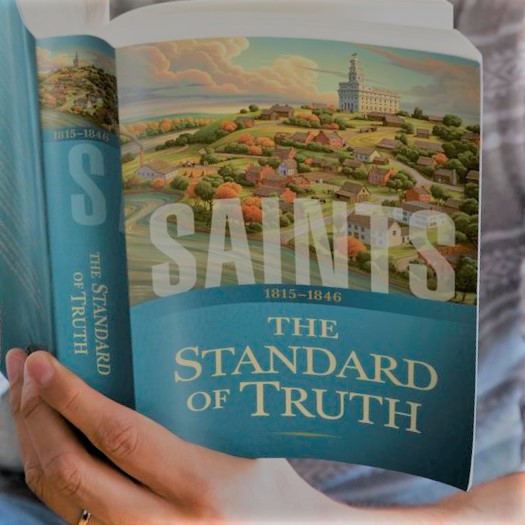S A I N T S: “THE COURT FIND[S] THE DEFENDANT GUILTY…”
“[Josiah Stowell’s] nephew [Peter G. Bridgeman], claiming that Joseph had taken advantage of his uncle, brought the young man to court and charged him with being a fraud.
“Standing before the local judge, Joseph explained how he had found the stone. Joseph Sr. testified that he had constantly asked God to show them His will for Joseph’s marvelous gift as a seer. Finally, Josiah stood before the court and stated that Joseph had not swindled him.
“‘Do I understand,’ said the judge, ‘that you believe the prisoner can see by the aid of the stone?’
“No, Josiah insisted. ‘I positively know it to be true.’
“Josiah was a well-respected man in the community, and people accepted his word. In the end, the hearing produced no evidence that Joseph had deceived him, so the judge dismissed the charge.”
Saints (Volume 1): The Standard of Truth 1815-1846 (Salt Lake City, UT: The Church of Jesus Christ of Latter-day Saints, 4 September 2018), 4:33-34.
As was alluded to previously, Joseph Smith was prosecuted in New York, on 20 March 1826; six months removed from his last heavenly visitation on Cumorah’s hill.
Please observe the five final words of the quote above, “…the judge dismissed the charge.”
Compare this to the final six words found in the docket entry on the church’s Joseph Smith Papers site, “…the court find[s] the defendant guilty.”
The Stowell testimony referenced above comes from the Chenango Union newspaper, published in 1877. The article also read…
“[Stowell] swore that the prisoner [Joseph Smith, Jr.] possessed all the power he claimed, and declared he could see things fifty feet below the surface of the earth, as plain as the witness could see what was on the Justices’ table and described very many circumstances to confirm his words.”
No direct evidence was provided to prove these claims, nor did Joseph Smith demonstrate these talents to the court during the procedures.
It’s interesting to note that Peter G. Bridgeman was the person filing the complaint on behalf of Josiah Stowell. Peter’s uncle appeared to be fully immersed in Smith’s glory:
“Josiah Stowell, a Mormonite, being sworn, testified that he positively knew that said Smith never had lied to, or deceived him, and did not believe he ever tried to deceive anybody else. The following questions were then asked him, to which he made the replies annexed:
[Question:] Did Smith ever tell you there was money hid in a certain place which he mentioned?
[Answer:] Yes.
[Q:] Did he tell you, you could find it by digging?
[A:] Yes.
[Q:] Did you dig?
[A:] Yes.
[Q:] Did you find any money?
[A:] No.
[Q:] Did he not lie to you then, and deceive you?
[A:] No! The money was there, but we did not get quite to it!
[Q:] How do you know it was there?
[A:] Smith said it was!”
A.W. Benson, Evangelical Magazine – Volume 2, Issue 15 “Mormonites” (Utica, NY: Evangelical Magazine and Gospel Advocate, 9 April 1831), 120,
Yes, the final words by Josiah Stowell sum up everything we’re asked to buy into with Mormonism. It’s never been about the current state of the church, the doctrines, the temple, or racism. No, it’s not even about the authenticity of the Book of Mormon. Everything hinges on Joseph Smith, Jr. And why are we to believe the church is true? Because Joseph “Smith said it was!”
RE-rewrite:
“[Josiah Stowell’s] nephew [Peter G. Bridgeman], claiming that Joseph had taken advantage of his uncle, brought the young man to court and charged him with being a fraud.
“Standing before the local judge, Joseph explained how he had found the stone. Joseph Sr. testified that he had constantly asked God to show them His will for Joseph’s marvelous gift as a seer. Finally, Josiah stood before the court and stated that Joseph had not swindled him.
“‘Do I understand,’ said the judge, ‘that you believe the prisoner can see by the aid of the stone?’
“No, Josiah insisted. ‘I positively know it to be true.’ When asked if he thought Joseph could locate buried treasure, he answered in the affirmative. When asked “How do you know [the treasure] was there?” He replied, “Smith said it was!”
“Josiah was a well-respected man in the community, and people accepted his word. In the end, the hearing produced no evidence that Joseph had magical powers, so the judge convicted him. The record shows: ‘the court find[s] the defendant guilty.’”

